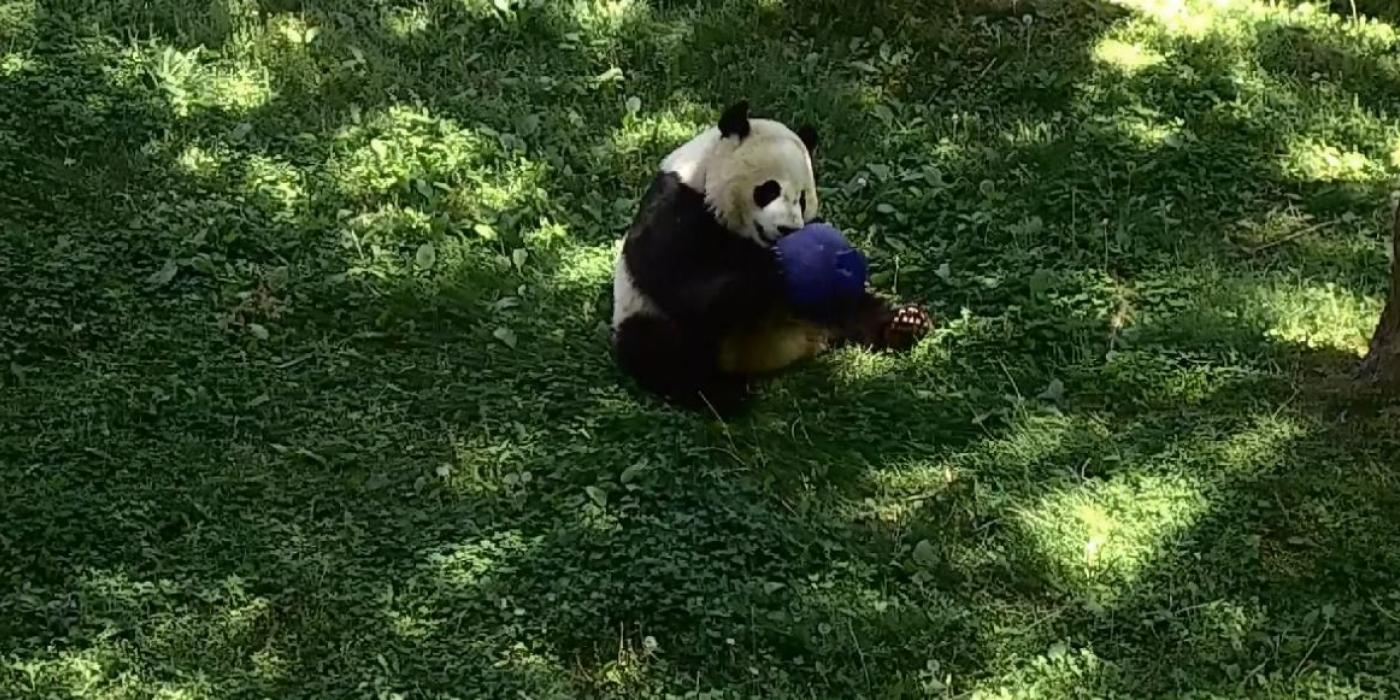How Bei Bei Has Started His Summer
Bei Bei is a bit of a daredevil. Although eating and sleeping are still his favorite pastimes, the giant panda cub loves to climb trees. Lately, he has been climbing trees in his yard and sliding all the way down. Giant pandas are excellent climbers, but they are also built to withstand falls. Just as his sister Bao Bao did at the same age, Bei Bei has broken several branches in the process, much to the dismay of the Zoo’s horticulturalists. The young bear has also taken a liking to assorted-sized tubs and spends a lot of time plonked in them—even the little ones that he has outgrown—munching on bamboo or just taking in his surroundings.
The almost two-year-old was weaned successfully from his mother Mei Xiang earlier this year, which took about a week of adjustment. “After the first week, they move on and live life separately,” says Laurie Thompson, assistant curator of giant pandas. These days, life for Bei Bei also involves a lot of eating and sleeping—particularly on his hammock made of donated firehose that his older sister Bao Bao also used.
A good eater with a special affinity for bamboo, Bei Bei now weighs roughly 150 pounds—significantly more than his older brother Tai Shan who, at Bei Bei’s age, weighed roughly 130 pounds and Bao Bao who, at 20 months, was about 115 pounds. Last month, Bei Bei passed a mucus stool—a small sticky chunk of mucus—which caused him some discomfort for several hours, but after he passed it he bounced right back. Mucous stools are not uncommon in giant pandas. They usually follow a short episode of abdominal discomfort and decreased appetite. Usually, once a mucous stool is passed the panda feels better and he begins eating and behaving normally. The panda team monitors all of the pandas who are experiencing the signs of a mucous stool carefully to be sure their behavior returns to normal after passing it.
Keepers have also continued their training with Bei Bei so he learns to show them different parts of his body as well as open his mouth and lie down. He’s also learning to put his paw on or under the enclosure mesh for keepers to look at—behavioral skills that will enable veterinarians to easily examine him, if needed. They have also introduced him to a variety of enrichment toys that test a panda’s physical and cognitive abilities. For instance, they will offer Bei Bei a ball filled with biscuits and observe as he deciphers how best to reach them. These are skills that Bei Bei will most likely master after he turns two.
“He’s still learning about life,” says Thompson, who has been at the Zoo for more than two decades and helped raise most of Bei Bei’s family. She sees similarities between Bei Bei and his father Tian Tian—both of whom Thompson characterizes as laidback and sweet.
The panda team is still waiting for Mei Xiang to go into estrus and is monitoring her behavior and hormones closely, but she has not yet shown strong behaviors they would expect to see if the brief window when she is receptive to breeding was imminent. As an older female, she may be past her reproductive years. Tian Tian on the other hand has been very restless and seems to be very interested in Mei Xiang.
Related Species:



